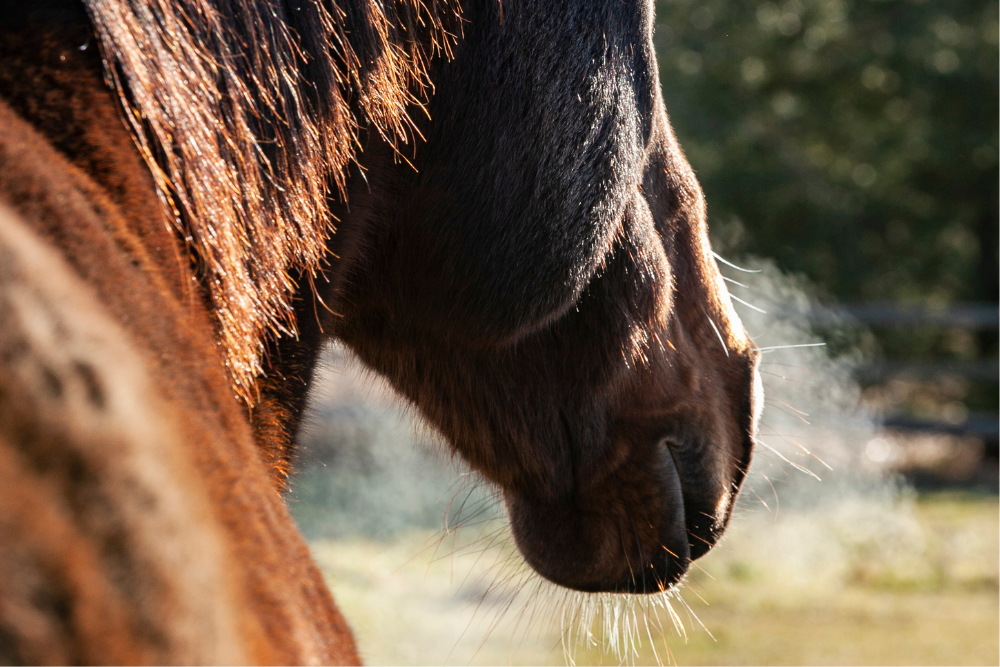Safeguarding and Supporting the Equine Respiratory System

Written by Briony Witherow MSc, BSc, RNutr.
There are many aspects of our horse’s environment which can negatively impact the respiratory system, some that are within our control, and others very much outside this. This month’s blog focuses on areas of feed management which we can optimise for respiratory health and supplements which can be employed proactively and reactively when faced with respiratory compromise.
It goes without saying that any horse in respiratory distress should be seen by a vet. Respiratory compromise can range from mild to more serious and is often cumulative throughout a horse’s life; research suggests that signs are often not apparent until the horse is chronically affected. As such, proactive management to reduce dust for all horses regardless of current respiratory health is always recommended.
For those with seasonal or chronic respiratory challenges, the first step should be to assess the environment. Often the diagnosis of respiratory compromise will be categorised as either Recurrent Airway Obstruction (RAO), caused by hypersensitivity to airborne particles in the stabled environment, or Summer Pasture-Associated Obstructive Pulmonary Disease (SPAOPD), which, as the name suggests, is caused by hypersensitivity to airborne particles at pasture. While some horses can be affected by both, establishing which environment triggers respiratory compromise can provide a focus for management.
What can we control?
There are many elements of our horse’s environment which can contribute to poor respiratory health. Dust is inherent in many areas of the stabled environment from bedding, forage, and the amount of ventilation. We can manage this by considering bedding choice (not only considering dust but also absorbency to reduce ammonia); general management (e.g., promoting ventilation, dusting, grooming outside, removing the horse from the stable while mucking out, management of arena surfaces); and through choice of feed.
Forage is a key source of dust and respirable particles which we can control. Hay, due to the means of preservation (dehydration) is naturally drier and therefore ‘dustier’. We can moderate this by soaking or steaming hay. A short soak of 10-20 minutes will effectively swell respirable particles meaning these are consumed instead of inhaled but be mindful that this effect wanes as the hay dries out. Steaming hay using a high temperature steamer has been shown to be the most effective means of reducing respirable particles, with the effect lasting longer at 24 hours. The alternative to hay is haylage, with its higher moisture content (due to preservation through fermentation) meaning that respirable particles are often lower (note not dust free) and therefore is often the preferred choice. Note that haylage can also be steamed to further improve hygienic quality. Where possible, turnout on pasture may be the gold standard in terms of reducing respirable particles from feed and the stabled environment, however depending on the source of respiratory irritation (pollen, for example), this may be ruled out. Feeding position can also be optimised for the respiratory challenged horse – feeding from the ground can aid in clearing the airways.
When it comes to the bucket feed and respiratory health, feed hygiene is key. Ensuring feed bins and scoops are cleaned regularly and best before dates are noted is essential. Dust levels within the bucket feed can also be managed by wetting the feed or combining with soaked feeds or mashes. In addition to this, ensuring that protein levels are optimal and not excessive can help reduce environmental ammonia (excreted urea is converted to ammonia by bacteria) which can be a respiratory irritant.
Factors out of our control
Science suggests a genetic component predisposing horses to severe respiratory compromise associated with an allergic reaction (hypersensitivity) to airborne particles within the horse’s environment. Summer pasture associated obstructive pulmonary disease (SPAOPD) is typically seen with horses at pasture for >12 hours per day with onset of symptoms during late spring to mid-autumn. High temperature and humidity often result in more severe symptoms. Controlling environmental allergens is particularly challenging. Practical interventions such as the use of nose nets and stabling during the summer months can be employed, alongside recommended veterinary management.
How can supplements help?
Ensuring a balanced diet to help support general health and immunity is always a good starting point. Further to this, vitamin C has been shown to be effective in supporting horses with respiratory compromise. Vitamin C levels within the lungs and surrounding tissues have been shown to be lower in horses with lung inflammation. As such, elevated levels may be beneficial for those with respiratory compromise. Omega 3 fatty acids known for their anti-inflammatory effect have also been indicated in research to be beneficial for horses with airway inflammation. Garlic, honey, aloe, eucalyptus, and a variety of herbal extracts (including menthol and liquorice) are all associated with anti-inflammatory properties and help to clear mucus from the airway.
Take home points
· Keep a close eye on respiratory health throughout the year, taking regular note of resting respiratory rate and if seasonal irritants are suspected, record this along with weather, exercise type and location and reflect on this with your vet.
· Ensure that management and diet are optimised for all horses to reduce respiratory challenge.
· Where targeted support is required, aim for supplements which include additional antioxidant support (vitamin C) and those known for anti-inflammatory and mucus clearing properties. Products such as Breeze Up (containing honey, apple cider vinegar and garlic), Garlic Nectar Syrup or Extra Inputs for Performance Horses (containing high levels of vitamin C) may be suitable options.
